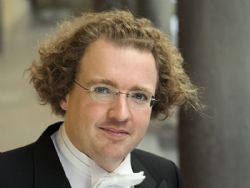|
Symphony
FROM THE NEW WORLD TO THE OLD WORLD
by Peter Lert
Saturday, June 14, 2025
Chamber
MC2 DUO RECITAL CLOSES 222'S SEASON
by Terry McNeill
Saturday, June 14, 2025
Choral and Vocal
CANTIAMO SONOMA'S LUSCIOUS A CAPELLA SINGING IN SEASON ENDING CONCERT
by Pamela Hicks Gailey
Sunday, June 8, 2025
Symphony
SRS SEASON ENDS WITH RESOUNDING TA-TA-TA-BANG
by Terry McNeill
Sunday, June 1, 2025
Symphony
YOUTHFUL VIRTUOSITY ON DISPLAY AT USO'S MAY CONCERTS
by Peter Lert
Saturday, May 17, 2025
Symphony
MYSTICAL PLANETS AND LIVELY GERSHWIN ORTIZ AT FINAL SRS CONCERT
by Peter Lert
Sunday, May 4, 2025
Symphony
VSO'S CONCERT MUSIC OF TIME, MUSIC OF PLACE
by Peter Lert
Sunday, April 27, 2025
VOCAL ELEGANCE AND FIRE AT THE 222'S RECITAL APRIL 26
by Pamela Hicks Gailey
Saturday, April 26, 2025
CANTIAMO SONOMA SINGS AN INSPIRED GOOD FRIDAY MOZART REQUIEM CONCERT
by Pamela Hicks Gailey
Friday, April 18, 2025
DRAMATIC SHOSTAKOVICH SYMPHONY CLOSES PHILHARMONIC'S 25TH SEASON
by Terry McNeill
Sunday, April 13, 2025
|
 |
 Conductor Stéphane Deneve |
BEYOND THE GOLDEN GATE
by Terry McNeill
Thursday, October 16, 2014
Three works composed within three years of each other were programmed in the San Francisco Symphony’s concert in Weill Hall on Oct. 16, but each was sharply different.
Before a nearly full house, conductor Stéphane Denève opened with Barber’s iconic Adagio for Strings, Op. 11, in a compelling but not overly intense 10-minute performance. Cutoffs were precise, as were the violin section attacks. Mr. Denève fashioned a short concluding fermata but momentarily stopped any audience response with his left hand held high and motionless.
Strangely this mesmerizing music was quickly forgotten as violinist Isabelle Faust tackled Britten’s rarely played Violin Concerto, Op. 16, a virtuosic interplay of orchestra and soloist. Playing from score, Ms. Faust negotiated the continual high-register thematic lines and violent right-hand string plucks and slaps with aplomb. Meanwhile, Mr. Denève had consummate control over the orchestra, never covering the soloist.
At times in the Vivace movement, the music became violin against orchestra, and bits of Shostakovich’s Fourth Symphony sounded in Britten’s power climaxes. There was a long violin slide to a magnificent cadenza, along with stellar playing by the trombones, tuba and French horns. Ms. Faust deftly handled the special technique of simultaneous bowing and pizzicato.
The Passacaglia finale had a menacing character, anchored by the powerful violin sound and solos by harp and clarinet. At the end, the Symphony’s refined quiet playing underscored a lovely slow trill from Ms. Faust. Mr. Denève again stopped the expected ovation with a raised arm for many seconds after the music ceased.
For Rachmaninoff’s Symphonic Dances, the orchestra was augmented by saxophone and piano. The playing was virtuosic for a not-long-at-all 39 minutes. Instrumental duos were spread throughout the orchestra: harp and piano, saxophone and oboe, English horn and flute, string tremolos with bassoon, and even the juxtaposition of trombones and trumpets. The string section handoffs (violas to violins) were seamless, and fast accelerandos and strident passages were played faultlessly.
There is nothing Russian about these dances from a composer who was intensely Russian. Mr. Denève’s authoritative baton was always whirling and thrusting, asking often for a vast volume of sound. Weill Hall and ultimately the audience responded in kind.
Following a raucous ovation, Mr. Denève breathlessly addressed the audience to praise Weill’s acoustics and rhetorically ask for a return concert with this marvelous orchestra.
Violinist Ruggiero Spalding contributed to this review
|
